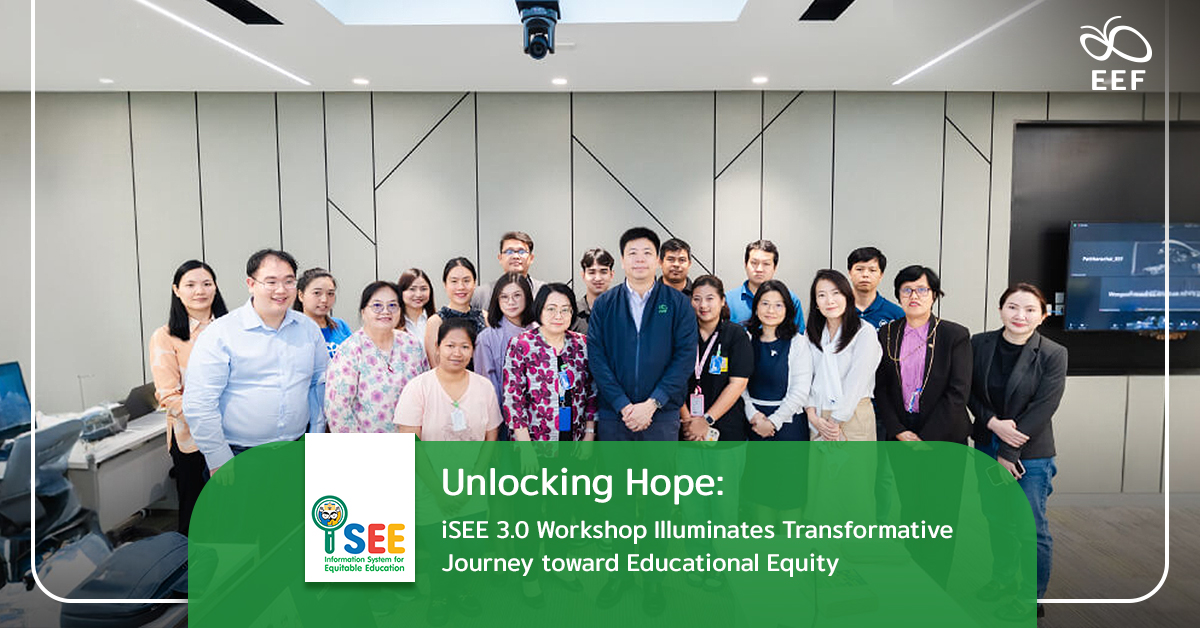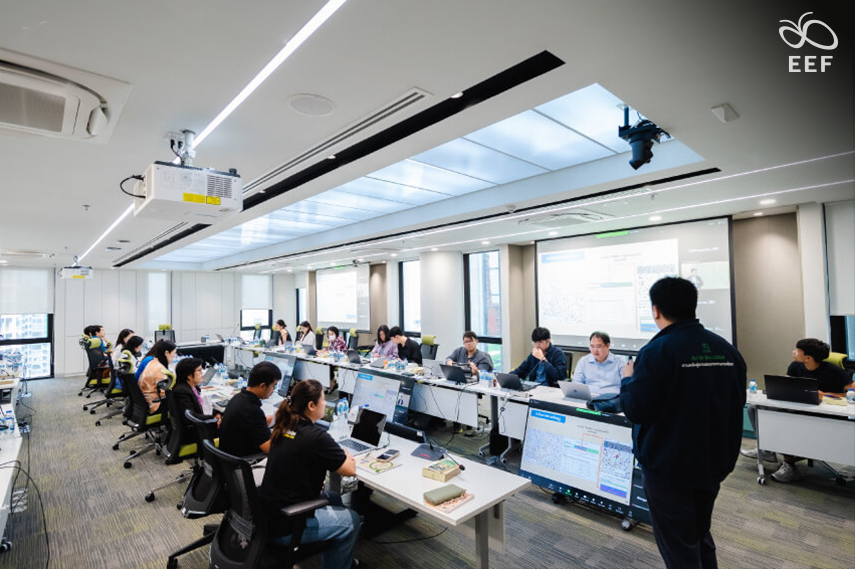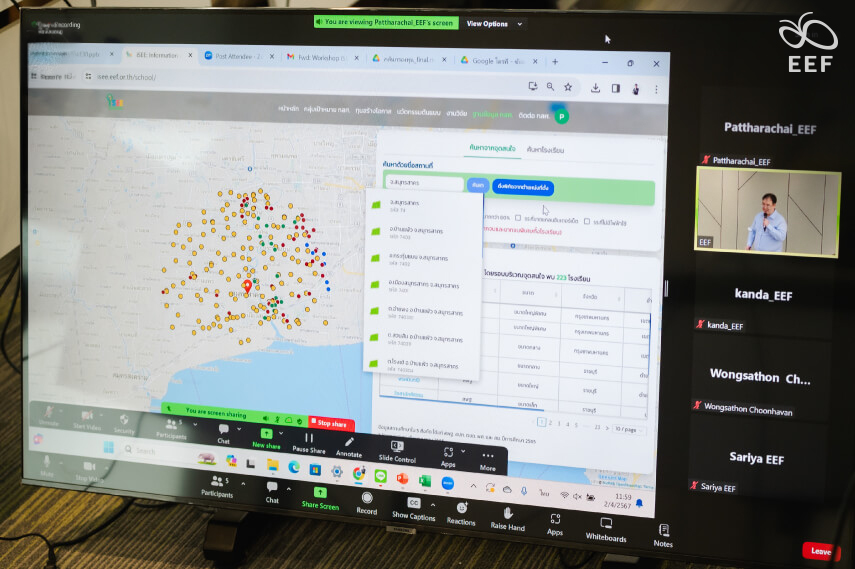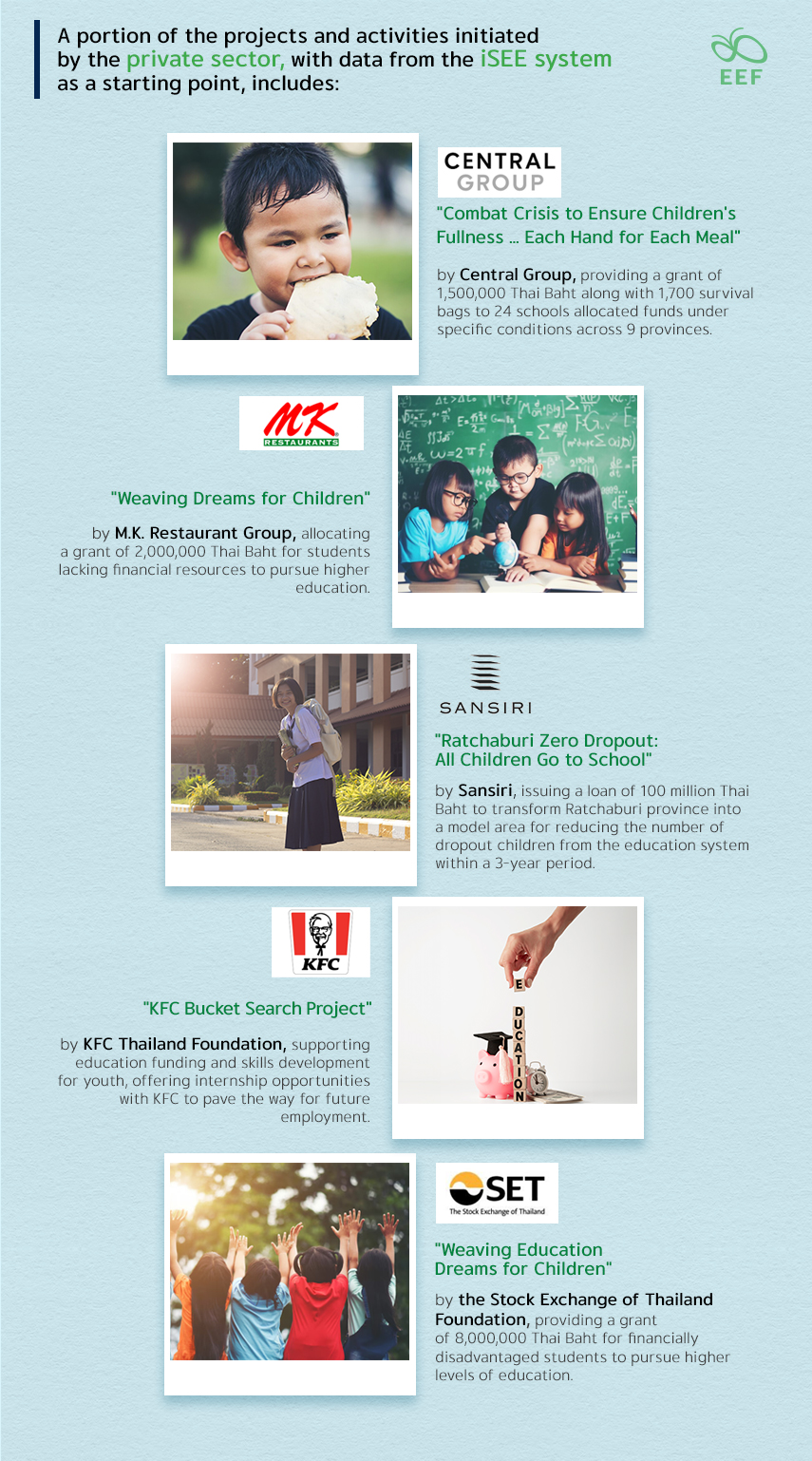
The iSEE (Information System for Equitable Education) is a large-scale statistical database system aimed at tackling educational disparities among over 4 million financially disadvantaged children and youth in Thailand. By gathering socioeconomic data from over 30,000 schools nationwide through household visits by approximately 400,000 teachers and using the Proxy Means Test criteria, the project links their identification numbers with government databases and Geographic Information Systems (GIS). This comprehensive data collection enables ongoing tracking of educational disparities and facilitates efforts to improve individual quality of life. The Equitable Education Fund (EEF) Thailand anticipates that the iSEE system will serve as a valuable resource for various sectors, promoting collaborative efforts to address educational inequalities. With the system now at version 3.0, it has recently organized the “All for Education — iSEE 3.0 Workshop” to demonstrate its use, building upon the success of previous versions and recognizing its effectiveness in targeting and assisting disadvantaged children and youth. This was also to gather valuable feedback and offer insightful recommendations aimed at enhancing the system’s effectiveness in fulfilling the EEF’s founding ethos — All for Education.

Highlighting the challenges in addressing educational disparities due to a lack of tools for deep insight, the iSEE utilizes data to identify and mitigate educational inequalities through interagency collaboration, resource mobilization, and community network integration. The data reveal critical educational gaps, particularly during transitions between educational levels, notably from Grade 6 to Grade 7 and from Grade 9 to Grade 10 or vocational education, where many children drop out due to challenges in transitioning between schools, especially over long distances of 10-50 kilometers. This underscores the importance of rallying collaboration with other sectors to support students transitioning to higher education levels. In this context, the initiative’s role lies in providing deep insights into the situations of children and schools nationwide, facilitating effective network connections to provide necessary support and resources to disadvantaged children.

Amidst the COVID-19 crisis, the iSEE system exposes ongoing income declines, notably affecting low-wage workers and those with short-term contracts, with an average income in 2023 of 1,039 Thai Baht per month for this demographic. This directly impacts children from households below the poverty line, estimated at around 1.2 million people. Serving as a crucial tool, the iSEE database identifies and connects with organizations across various levels, from province-, district-, sub-district, to school-level, as well as across diverse sectors, from public, private, civil society to the general public, interested in providing educational funding or support to this group. Real-life observations provide valuable insights for teachers in building deep relationships with students, leading to further community assistance. Notably, around 50% of parents in this group have only completed primary education, perpetuating the cycle of poverty. Therefore, efforts to improve compulsory education and transition more students to higher levels are crucial for breaking this cycle and uplifting the nation’s overall income levels. The iSEE system plays a pivotal role in facilitating these transformative efforts.
In addition to the 1.2 million children screened for assistance, data from 2023 indicates another million from households below the poverty line were overlooked for state funding, making them prime candidates for private-sector collaborations galvanized by the EEF. Among them, there are 168,307 completed compulsory education, but only approximately 130,000 progressed to Grade 10 or vocational school, indicating a dropout rate of approximately 20%, revealing a critical gap requiring “Quick Win” urgent strategies. Continuous improvement of the iSEE system is crucial for inclusivity, enabling users to access comprehensive data on children and schools, and aiding decision-making for funding allocation and educational activities. Various private sector initiatives leverage iSEE data to support education financially and materially, while collaborations extend to other organizations, fostering a holistic approach to educational support.

A portion of the projects and activities initiated by the private sector, with data from the iSEE system as a starting point, includes:
- “Combat Crisis to Ensure Children’s Fullness … Each Hand for Each Meal” by Central Group, providing a grant of 1,500,000 Thai Baht along with 1,700 survival bags to 24 schools allocated funds under specific conditions across 9 provinces;
- “Weaving Dreams for Children” by M.K. Restaurant Group, allocating a grant of 2,000,000 Thai Baht for students lacking financial resources to pursue higher education;
- “Ratchaburi Zero Dropout: All Children Go to School” by Sansiri, issuing a loan of 100 million Thai Baht to transform Ratchaburi province into a model area for reducing the number of dropout children from the education system within a 3-year period;
- “KFC Bucket Search Project” by KFC Thailand Foundation, supporting education funding and skills development for youth, offering internship opportunities with KFC to pave the way for future employment;
- “Weaving Education Dreams for Children” by the Stock Exchange of Thailand Foundation, providing a grant of 8,000,000 Thai Baht for financially disadvantaged students to pursue higher levels of education.
Following the experimentation phase, insights gleaned from the iSEE 3.0 Workshop underscored the pivotal role played by the database in advancing the cause of educational equity. By delving into the database’s wealth of information, participants were able to discern and understand the nuanced needs of various target groups with greater clarity. This understanding proved invaluable in devising tailored interventions and support mechanisms to empower young individuals with the necessary tools and opportunities for personal and professional growth. Furthermore, the database facilitated a comprehensive analysis of vulnerable groups, shedding light on the multifaceted challenges they face within the education landscape. Armed with these insights, stakeholders were better equipped to formulate strategic initiatives and allocate resources in a manner that maximizes impact and addresses pressing issues with precision. Additionally, the database catalyzed collaboration and partnership, enabling organizations to pool their expertise and resources to extend targeted assistance, such as scholarships and skills development programs. This collaborative approach not only enhances the effectiveness of interventions but also ensures the sustainability and long-term impact of efforts aimed at uplifting disadvantaged youths and promoting inclusive education.

The iSEE 3.0 Workshop heralded a pivotal moment in the journey toward educational equity and opportunity. Through the lens of the iSEE (Information System for Equitable Education) platform, participants gained profound insights into the multifaceted challenges facing underserved communities. Delving deep into the database’s trove of information, stakeholders were empowered to discern the nuanced needs of diverse student populations with unprecedented clarity. This newfound understanding catalyzed the formulation of targeted interventions and support mechanisms aimed at empowering disadvantaged youth with the tools and opportunities needed for personal and professional growth. The workshop’s implications extend far beyond the confines of its proceedings, signaling a renewed commitment to the founding ethos of the Education Equality Foundation (EEF) — All for Education. As the EEF continues its tireless efforts to dismantle barriers to learning through research, collaboration, and support for children, youth, and adults in need, the iSEE system stands as a beacon of hope, guiding the way toward a future where every child has the chance to thrive and succeed through education.

